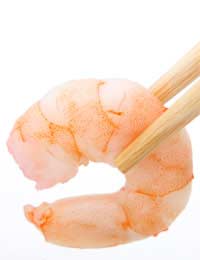Food Additives That Act as Xenoestrogens

There are all sorts of weird and wonderful food additives in existence, but have you ever heard of additives that act as xenoestrogens? It’s true, they do exist and new research has found two previously unrecognised food additives that act in this way.
What Are Xenoestrogens?
Put simply, xenoestrogens are substances that have similar effects to the hormone oestrogen, or estrogen, and act by mimicking the natural effect that oestrogen has. Whilst oestrogen is a perfectly natural hormone to have, it’s not so good for the human body to suddenly have another unnatural substance producing these effects.In fact, xenoestrogens have been linked to a range of unwanted health issues and problems, from reduced sperm counts in men to a potential increased risk of breast cancer for women.
Which Food Additives Act as Xenoestrogens?
It’s worrying to realise that food you’re innocently consuming could contain these additives that act as xenoestrogens. Scientists in Italy were concerned about the emergence of these substances and developed a method to search through 1,500 food additives and identify any that could act as xenoestrogens.As a result of their research, they’ve recently identified two new previously unrecognised xenoestrogens. The first is propyl gallate, which is used as a preservative in foods to help prevent fats and oils from going off. The second is 4-hexylreorcinol, which is used as an additive to help shrimp and other shellfish from losing their natural colour.
Another type of food additive that is already known to act as a xenoestrogen is butylayed hydroxyanisole, which is added to foods to help preserve them and making them longer lasting. Plus, the red food colouring agent, erythrosine, which is used in products such as sweets, is also a known xenoestrogen (interestingly, it’s not used much in the US anymore, due to its potential health risks).
As well as food additives, synthetic xenoestrogens are already known to crop up in other ways. For example, they are often found as an ingredient in plastics, pesticides, herbicides, various pharmaceutical products and personal care products. Although the amount of xenoestrogens in these types of products are generally quite small, they can still cause harm to humans when they come into contact with the products (i.e. xenoestrogens don’t have to be consumed to be harmful).
Are Xenoestrogens a Health Concern?
Xenoestrogens are increasingly becoming a health concern amongst experts. It’s bad enough that people are unknowingly being exposed to synthetic xenoestrogen chemicals in the environment or in products such as plastic bottle, but is even worse to discover they may be in the food we eat too.Previous research, for example, has looked at the potential link between xenoestrogens and the health condition endometriosis, and it’s also thought that xenoestrogens could decrease the sperm count in men and may even be a contributory factor in breast cancer
The scientists who discovered the existence of xenoestrogen qualities in propyl gallate and 4-hexylrescorcinal certainly think they are cause for concern and suggested that caution should be applied in their use. Consumers, however, might want to go one step further and actively avoid these additives, especially those concerned about their long term health. The best way of avoiding them is to either avoid purchasing processed foods or get savvy with checking out ingredient labels in the supermarket (it’s time-consuming, but worth it if you feel strongly about the issue).
- Complete List of ENumbers
- Additives in Cigarettes
- Children's Sweets and E Numbers
- Blue Smarties Return without E Numbers
- E900 - E999 Miscellaneous E Numbers
- E600 - E699 Flavour Enhancers
- E400 - E499 Thickeners, Stabilisers and Emulsifiers
- E1000 - E1999 Additional Chemicals
- E300 - E399 Antioxidants and Acidity Regulators
- E200 - E299 Preservatives
- E500 - E599 Acidity Regulators and Anti-Caking Agents
- E100 - E199 Colours


Re: Dangers and Side Effects of E Numbers
Is this the tip of the iceberg? Can't help thinking we all being slowly poisoned by convenience food. Convenient for…
Re: E200 - E299 Preservatives
Hallo I need advise on what preservetives and ant foaming agents to use for lemon juice. Also reconmondations on how much powders to…
Re: Top E Numbers to Avoid
Since Brexit, I have been adding a few extra E numbers in my products and my sales have boomed! I now sell the tastiest burger in town. E…
Re: E Numbers Not Suitable for a Halal Diet
Is E202 is halal?
Re: Does E631 Use Extracted Pig's Fat or Sardine Oil?
400
Re: E Numbers Not Suitable for a Halal Diet
E140 is a plant product, not derived from meat at all. Please check your facts.
Re: Top E Numbers to Avoid
I was prescribed amitriptyline for anxiety and got on well with the first box of tablets. After starting the second box I began to feel…
Re: E400 - E499 Thickeners, Stabilisers and Emulsifiers
All thickener agent name All emulsifier agents name Cemical use Food use
Re: Top E Numbers to Avoid
You say that E133 is banned in Germany, yet my GP has prescribed Fultium-D/Colecalciferol 800 out capsules with E133 and the Manufacturer…
Re: Does E631 Use Extracted Pig's Fat or Sardine Oil?
In India, there is a law already existing, that any food products having any non-vegetarian ingredients…